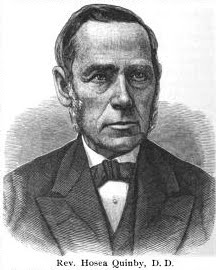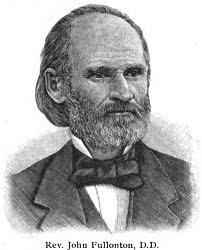
Philip Schaff was a Swiss-born, German-educated Protestant theologian and ecclesiastical historian, who spent most of his adult life living and teaching in the United States.

The American Baptist Churches USA (ABCUSA) is a Baptist Christian denomination established in 1907 as the Northern Baptist Convention, and named the American Baptist Convention from 1950 to 1972. It traces its history to the First Baptist Church in America (1638) and the Baptist congregational associations which organized the Triennial Convention in 1814.

Andover Theological Seminary (1807–1965) was a Congregationalist seminary founded in 1807 and originally located in Andover, Massachusetts on the campus of Phillips Academy.

Oren Burbank Cheney was an American politician, minister, and statesman who was a key figure in the abolitionist movement in the United States during the later 19th century. Along with textile tycoon Benjamin Bates, he founded Bates College as the first coeducational college in New England which is widely considered his magnum opus. Cheney is one of the most extensively covered subjects of Neoabolitionism, for his public denouncement of slavery, involuntary servitude, and advocation for fair and equal representation, egalitarianism, and personal sovereignty.

Cobb Divinity School was a Baptist theological institute. Founded in 1840, it was a Free Will Baptist graduate school affiliated with several Free Baptist institutions throughout its history. Cobb was part of Bates College in Lewiston, Maine, United States from 1870 until 1908 when it merged with the college's Religion Department.

Parsonsfield Seminary, which operated from 1832 to 1949, was a well-known Free Will Baptist school in North Parsonsfield, Maine, in the United States. Also known as the North Parsonsfield Seminary, its preserved campus of four buildings is located on State Route 160 near the New Hampshire border. The property is listed on the National Register of Historic Places.

The Interdenominational Theological Center (ITC) is a consortium of five predominantly African-American denominational Christian seminaries in Atlanta, Georgia, operating together as a professional graduate school of theology. It is the largest free-standing African-American theological school in the United States.
Andover Newton Theological School (ANTS) was a graduate school and seminary in Newton, Massachusetts, affiliated with the American Baptist Churches USA and the United Church of Christ. It was the product of a merger between Andover Theological Seminary and Newton Theological Institution. In recent years, it was an official open and affirming seminary, meaning that it was open to students of same-sex attraction or transgender orientation and generally advocated for tolerance of it in church and society.

John Jay Butler was an ordained minister and theologian in the early Free Will Baptist movement in New England, serving as Professor of Systematic Theology at Cobb Divinity School at Bates College in Maine and later at Hillsdale College in Michigan.
The Triennial Convention was the first national Baptist denomination in the United States. Officially named the General Missionary Convention of the Baptist Denomination in the United States of America for Foreign Missions, it was formed in 1814 to advance missionary work and headquartered in Philadelphia, Pennsylvania. In a dispute over slavery and missions policy, Baptist churches in the South separated from the Triennial Convention and established the Southern Baptist Convention in 1845. This split left the Triennial Convention largely Northern in membership. In 1907, the Triennial Convention was reorganized into the Northern Baptist Convention, which was renamed American Baptist Churches USA in 1972.

Jesse Appleton was the second president of Bowdoin College and the father of First Lady Jane Pierce.

The Oneida Institute was a short-lived (1827–1843) but highly influential school that was a national leader in the emerging abolitionist movement. It was the most radical school in the country, the first at which black men were just as welcome as whites. "Oneida was the seed of Lane Seminary, Western Reserve College, Oberlin and Knox colleges."

Rev. Ransom Dunn, D.D. was an American minister and theologian, prominent in the early Free Will Baptist movement in New England. He was President of Rio Grande College in Ohio, and Hillsdale College in Michigan. A Discourse on the Freedom of the Will is one of his most notable works.

The history of Bates College began shortly before Bates College's founding on March 16, 1855, in Lewiston, Maine. The college was founded by Oren Burbank Cheney and Benjamin Bates. Originating as a Free Will Baptist institution, it has since secularized and established a liberal arts curriculum. After the mysterious 1853 burning of Parsonsfield Seminary, Cheney wanted to create another seminary in a more central part of Maine: Lewiston, a then-booming industrial economy. He met with religious and political leaders in Topsham, to discuss the formation of such a school, recruiting much of the college's first trustees, most notably Ebenezer Knowlton. After a well-received speech by Cheney, the group successfully petitioned the Maine State Legislature to establish the Maine State Seminary. At its founding it was the first coeducational college in New England. Soon after it was established, donors stepped forward to finance the seminary, developing the school in an affluent residential district of Lewiston. The college struggled to finance its operations after the financial crisis of 1857, requiring extra capital to remain afloat. Cheney's political activities attracted Benjamin Bates, who was interested in fostering his business interests in Maine. Bates donated installments of tens of thousands of dollars to the college to bring it out of the crisis.
Moses Smart (1812–1873) was an American pastor, professor, physician, attorney, and first leader of what was later known as Cobb Divinity School at Bates College.

George Harvey Ball (1819–1907) was an American academic, pastor, writer, and founder of Keuka College in New York.

Hosea Quimby (1804–1878) was an American Free Will Baptist pastor, author, and president of the Parsonsfield Seminary in Maine and Smithville Seminary in Rhode Island.

George T. Day (1822–1875) was a Free Will Baptist writer, publisher, pastor and professor.

Thomas L. Angell (1837–1923) was an American Free Will Baptist pastor, academic, leader of the Lapham Institute, and early professor at Bates College in Maine.

Benjamin Francis Hayes (1830-1906) was a Free Will Baptist pastor, author, principal of the Lapham Institute, and early professor at Bates College in Maine.

















